How To Add Structured Data To Wordpress
Themeisle content is gratuitous. When you purchase through referral links on our site, we earn a committee. Learn More
Have you e'er landed on a Google event that includes star ratings, video thumbnails, or a detailed production description? These bits of boosted information are called rich results (formerly known as rich snippets), and the site lawmaking used to tell the search engine to detect that information is called schema markup. Search engines already automatically scan for relevant schema types on your posts and pages, but when you lot add together schema to WordPress (specifically telling Google the schema blazon), yous increase the take chances that your site gets those heart-catching rich results!
While there's no direct ranking heave from schema markup, rich results assistance make your site more enticing in the organic search results, which could indirectly heave SEO.
In this post, we'll explain more almost how schema markup works. So, nosotros'll show you how to add schema to WordPress using a simple plugin.
What practice schema markup and rich results wait like?
Schema markup is backside-the-scenes code on your WordPress site. Humans won't ever meet it, but search engines like Google use information technology to better understand your content and add visual elements called rich results, which wait like this:

Stars aren't the only rich results you'll run across, either. For case, you might see a recipe search result with the number of reviews, time to cook/prep the dish, and fifty-fifty the number of calories in the meal.
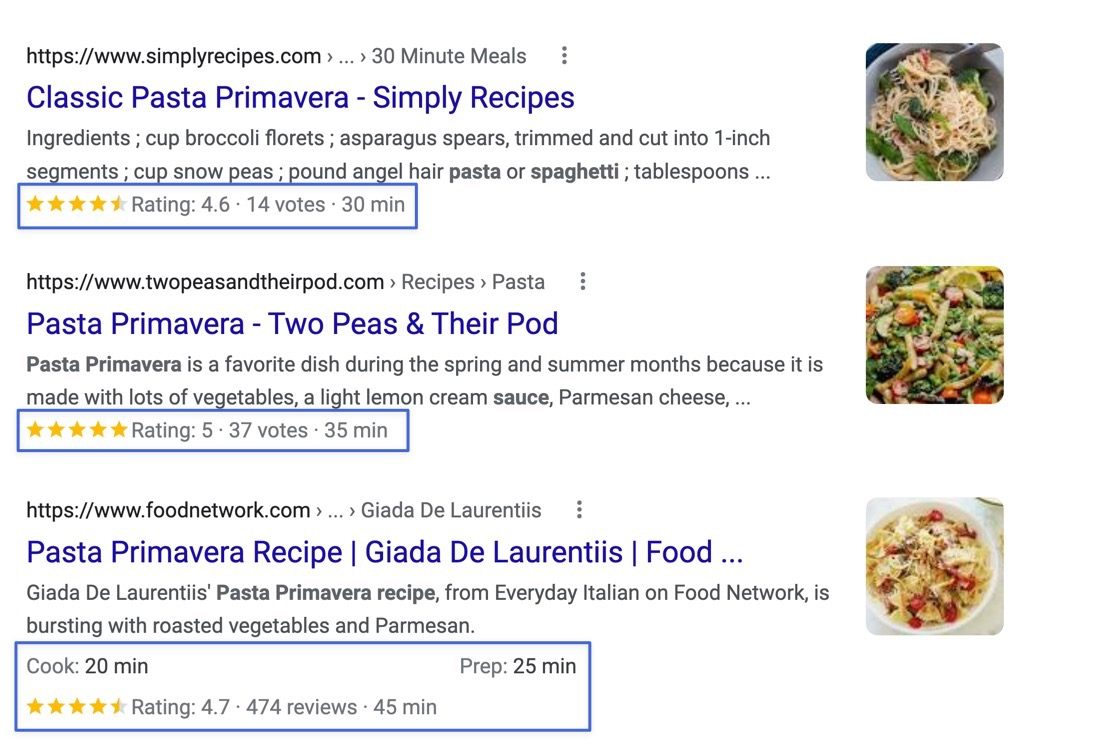
Depending on what blazon of content you take, search engines pull unlike schema markup. Schema types include:
- Articles
- Products
- Reviews
- Recipes
- Software applications
- Events
- Videos
- Job postings
- People
- Restaurants
- Services
- Music
- Local businesses – We accept a guide for business addresses and other schema info.
- Books
View the entire listing of schema types on Schema.org. You'll observe that each schema blazon has its ain rich consequence elements, similar "cook time" for recipes or "opening hours" for local businesses.

And then how can yous automatically add together schema to WordPress for your content? Only follow this guide:
How to add schema to WordPress
Schema markup already exists on your WordPress site, and search engines like Google already practice a pretty practiced job of figuring out the schema types on your posts and pages (like automatically identifying that a post is a recipe or tech review). However, Google isn't perfect, so it sometimes needs some extra schema indicators to specify what type of content actually exists on your posts and pages.
Use the following steps to add schema to WordPress.
Step ane: Install a plugin to add together schema to WordPress
Several developers have plugins to help you add schema to WordPress. Some let for individual rich result creation, while others automate the process of specifying schema markup for the search engines to recognize. Nosotros similar the plugins that accept a little of both, and those are usually in the form of SEO plugins similar Rank Math and Yoast SEO.
Rank Math gives you more command over schema in WordPress, and almost of its schema features are free, so nosotros recommend that one.
To start, install and activate the Rank Math plugin on your WordPress site. Acquire how to install WordPress plugins if you demand help.
Step 2: Assign default (global) schema markup for your pages and posts
Rank Match provides a stride-past-footstep start upwards guide; walk through each of these steps to configure basic SEO settings. Continue onto the Advanced Options department of the guide to detect the Schema Markup module.
- Turn on the Schema Blazon switch to construction and send schema markup to Google automatically.
- Choose a Schema Type for Posts to specify a default rich result type whenever yous make a WordPress post.
- Choice a Schema Blazon for Pages to specify a default rich upshot type whenever you create a WordPress page.
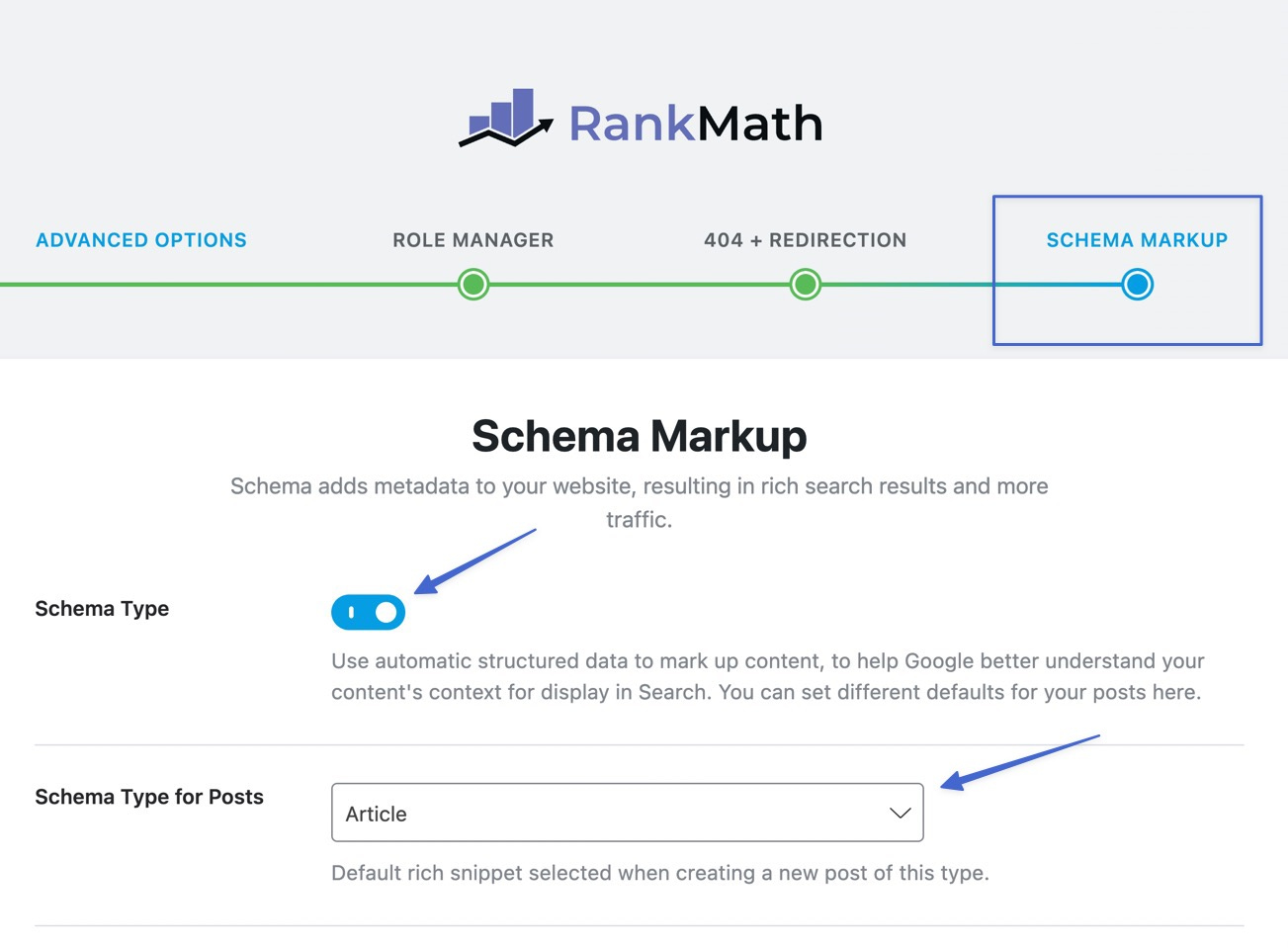
The dropdown menu provides various default rich outcome types for both posts and pages, including:
- Article
- Event
- Course
- Recipe
- Eating place
- Service
- Person
- Restaurant
- Software application
- Many more than
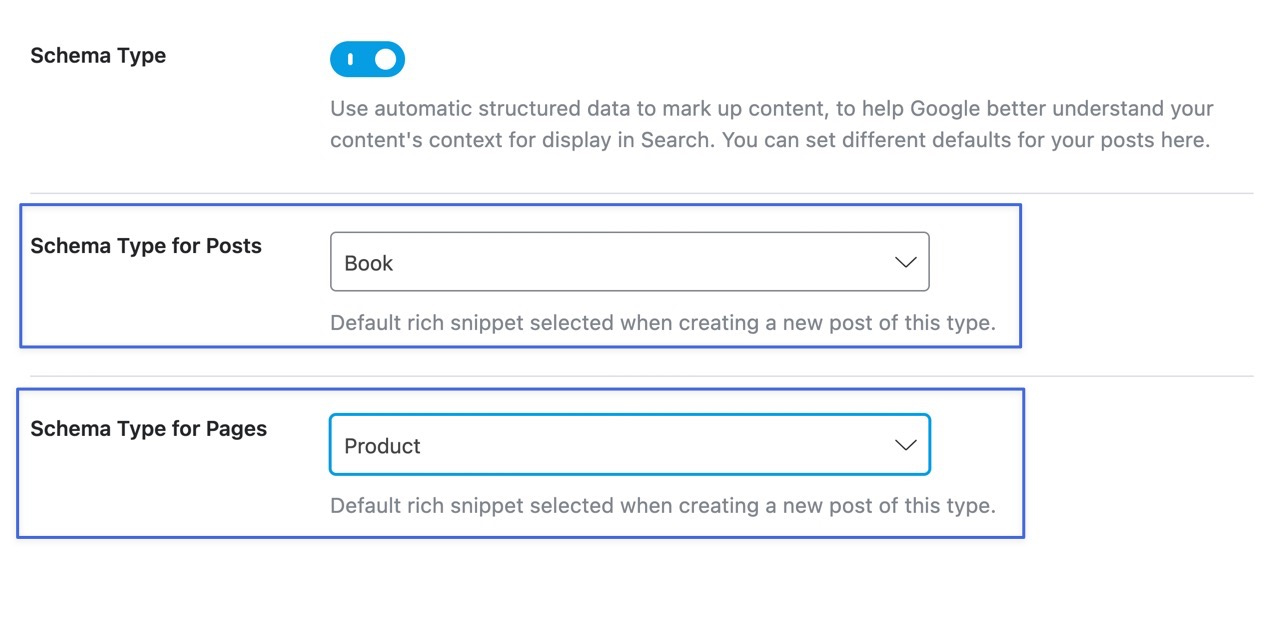
Some schema types ask for more data. For instance, the Article schema blazon wants to know if it is:
- A standard article
- A blog post
- A news commodity
That's because each of these article types deliver unique rich results to the search engines.

Click the Save and Continue button when you're done.
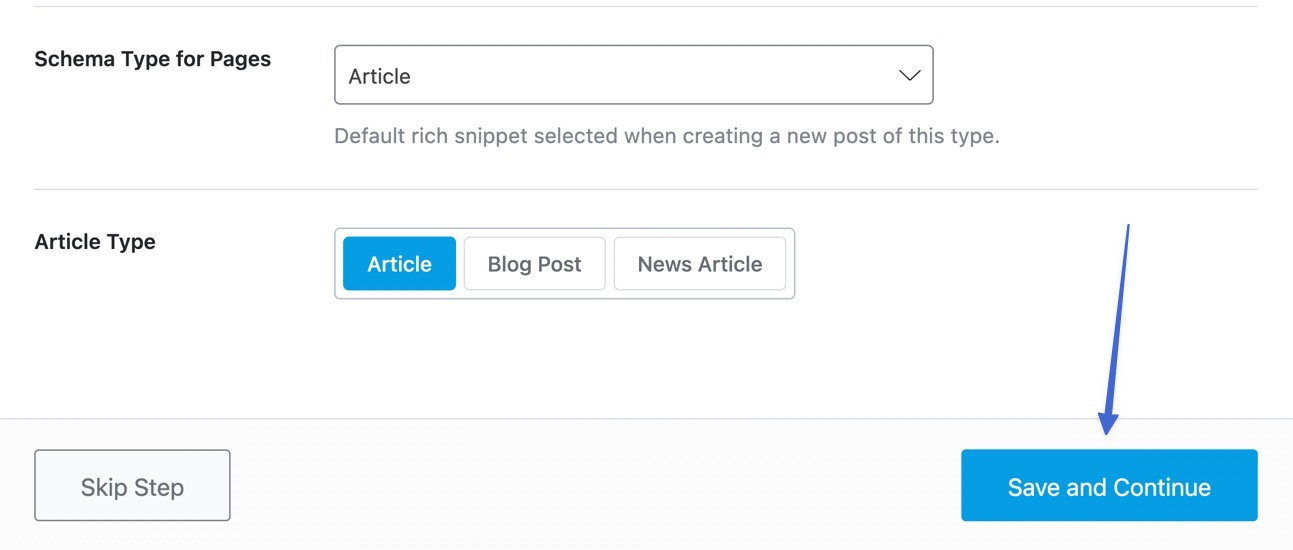
An alternative way to change your global schema types
It's always possible to modify those initial schema markup selections past going to Rank Math > Titles & Meta in WordPress. You lot can locate the settings under Post Types, then by clicking Posts or Pages.
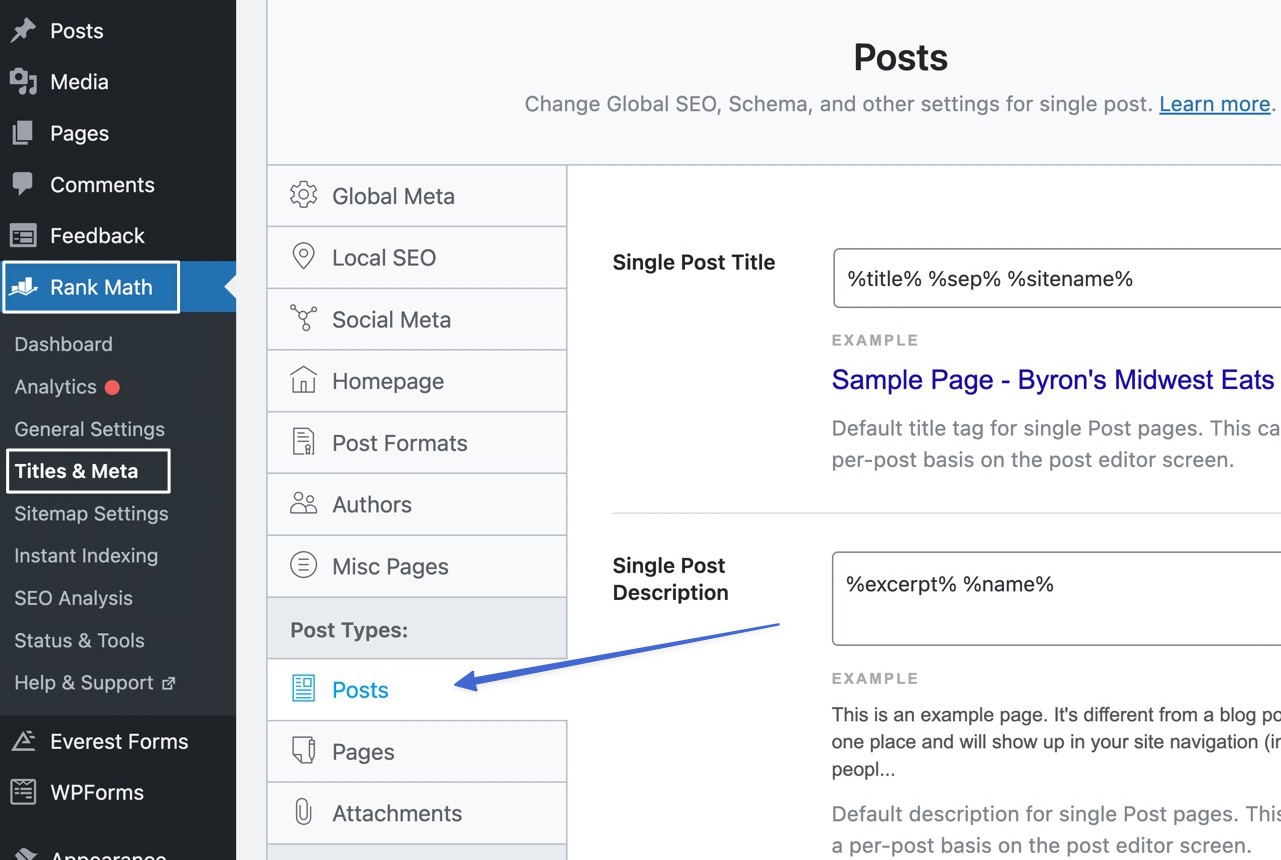
Just like in the outset up guide, this lets you lot change the default schema type beyond your unabridged WordPress site for posts and pages. Information technology even offers options to customize the headline and clarification for search results.
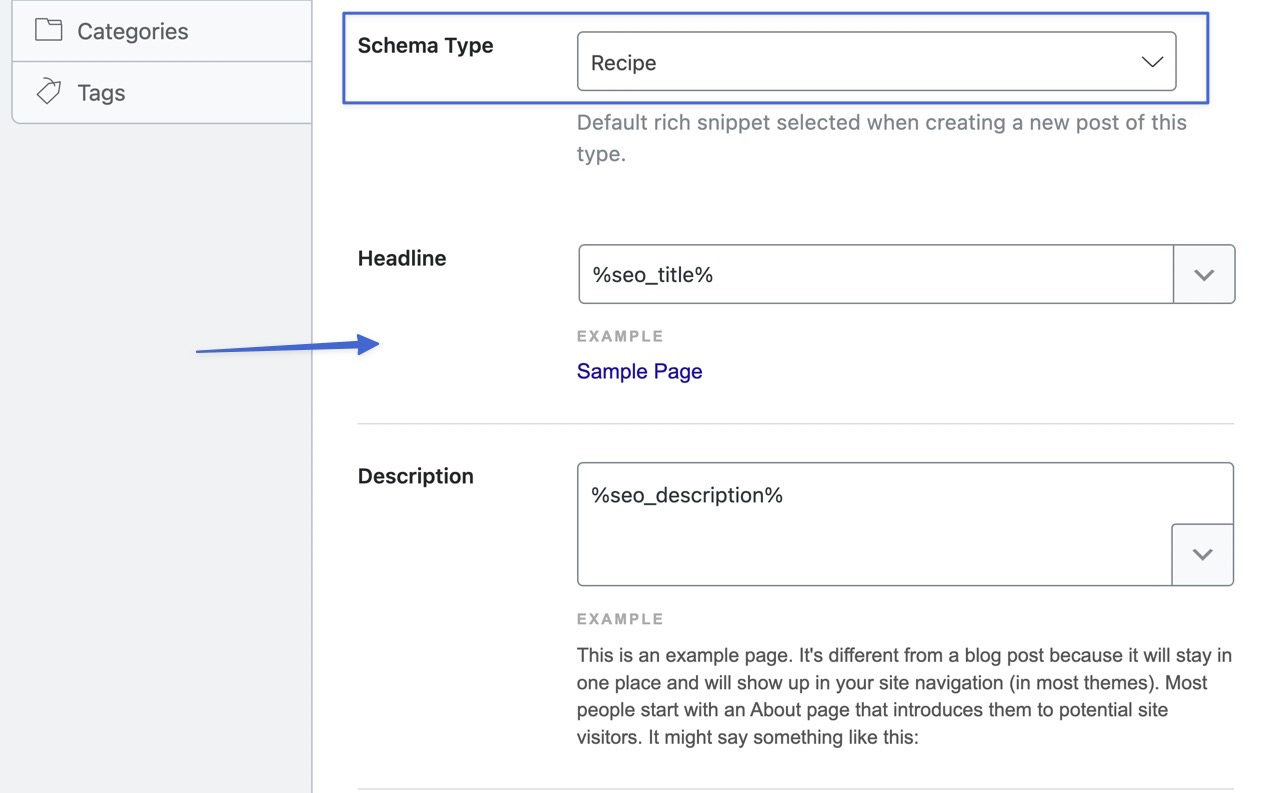
And the Pages tab offers the aforementioned thing, only for WordPress pages instead of posts.

Step 3: Add together unique schema markup to individual posts and pages
Besides your global settings, you have the selection to override the default schema markup, and fifty-fifty build rich results, in every WordPress post and page. To do this, open or create a new page or post.
In the editor, click the Rank Math button on the summit correct; the button shows an SEO score for the page or mail. You tin meet the electric current SEO preview when the Rank Math module appears.
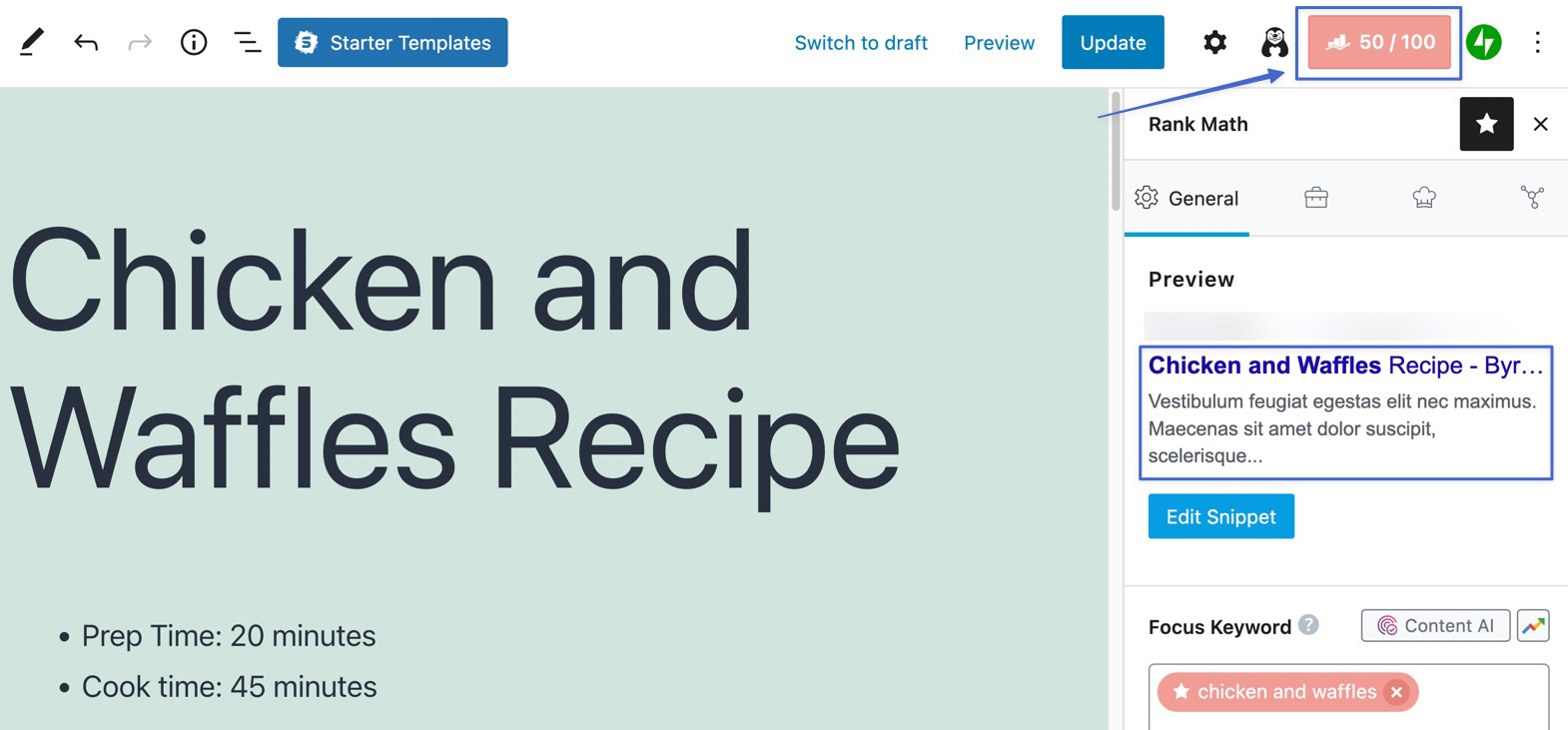
Click on the Schema tab. Choose the Edit push next to the current (global) schema type.
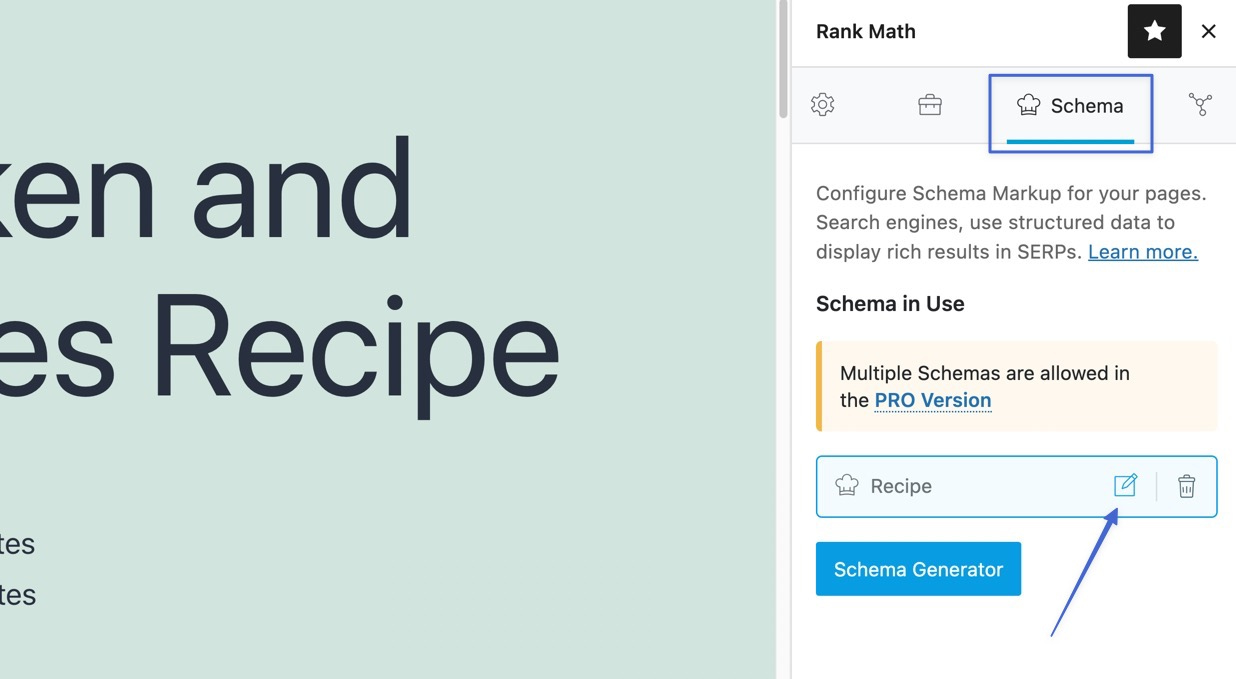
You also have the option to click the Schema Generator button, which lets you lot pick a new schema type from scratch.

The Schema Generator lists all schema types similar Articles, Books, Events, Job Postings, and Recipes. You can selection to Employ one and replace the global schema.
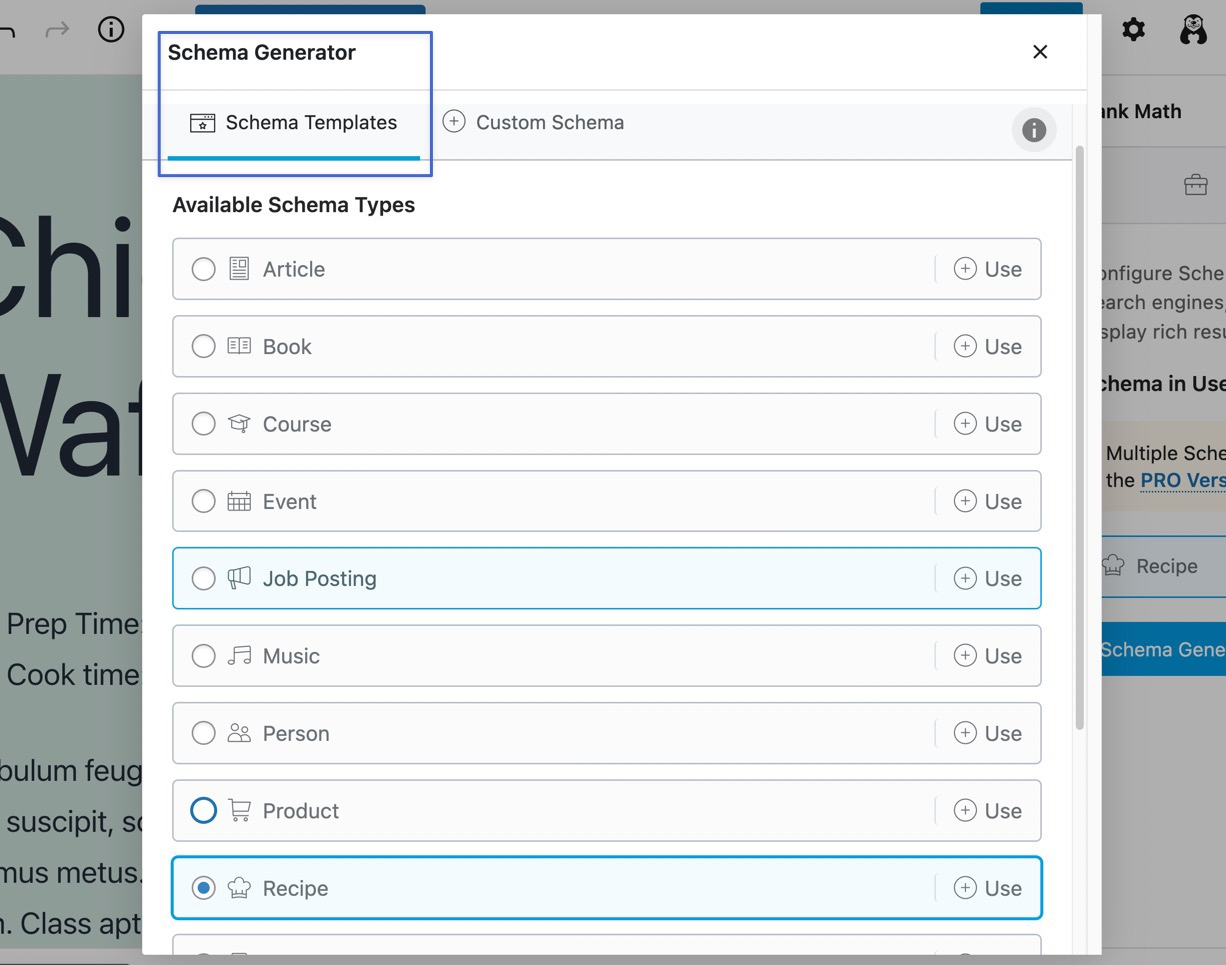
This reveals the Schema Builder window, where you tin type in specific schema elements for what's available in the schema type.
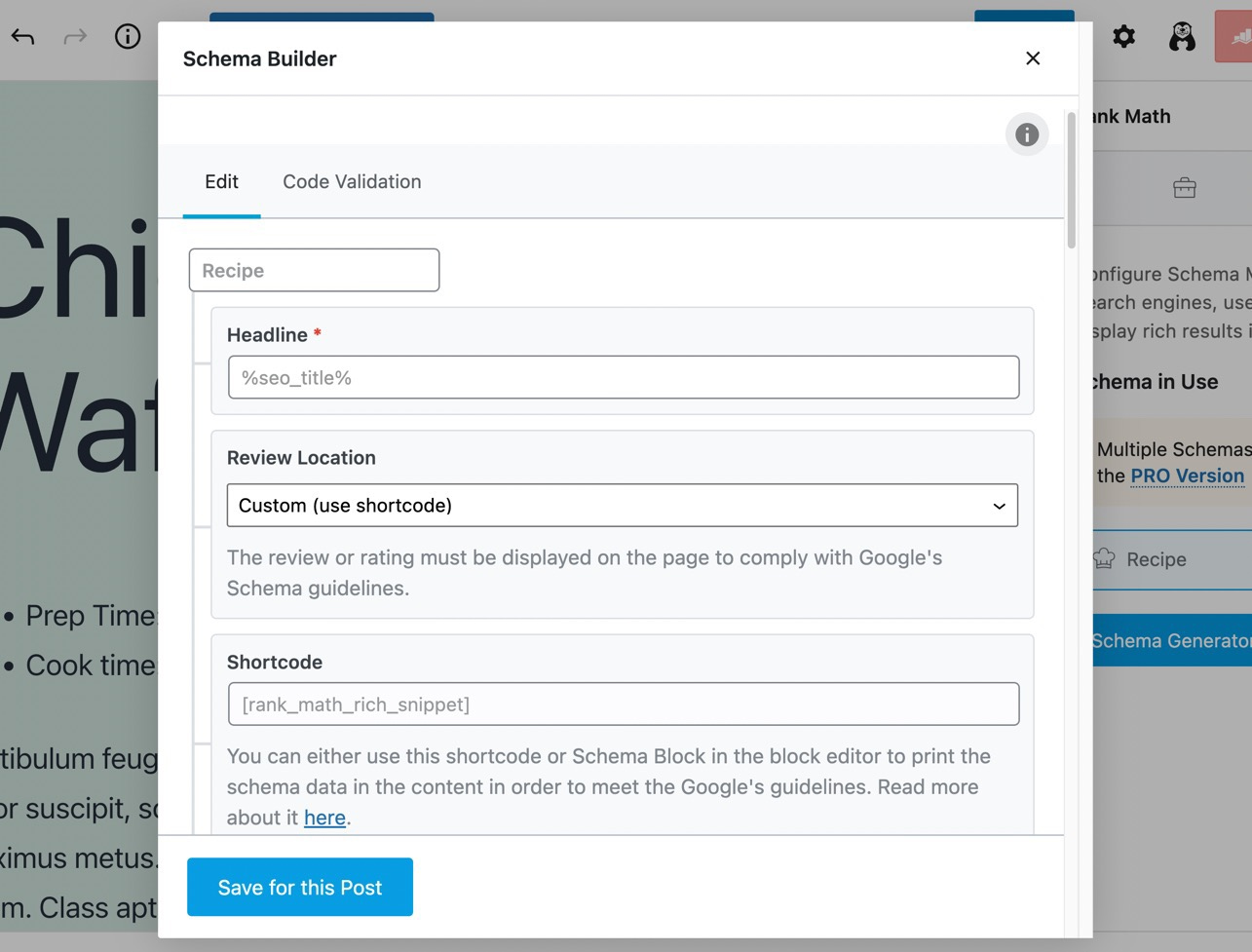
For instance, the Recipe schema type offers fields for:
- Preparation Time
- Cooking Fourth dimension
- Total Fourth dimension
- Type
- Calories
- Cuisine
- Much more
Fill up in the information yous'd like to appear on search engines for this post/page. Continue in mind that some fields require unique formats, like how recipe cooking and prep times employ the ISO 8601 format (example: PT1H30M).
Click Relieve For This Post when you're washed.

To save the changes, and prompt Google to index the page or post, click Update or Publish.
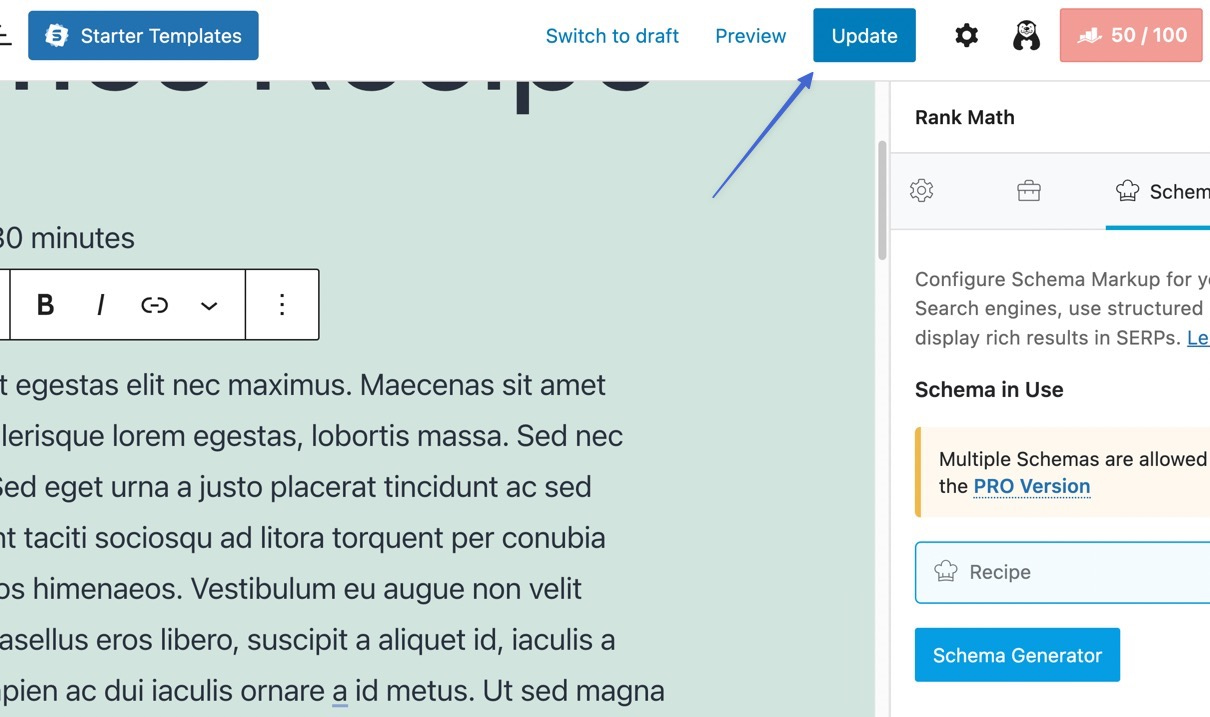
Step 4: Preview your rich results
Google usually takes some time to crawl your new posts and identify all relevant schema elements. Simply you should monitor your search results to run across which rich results appear.
You could always just search for the postal service or folio on Google, simply Rank Math also eventually renders some of the rich snippets in its Preview (under General).
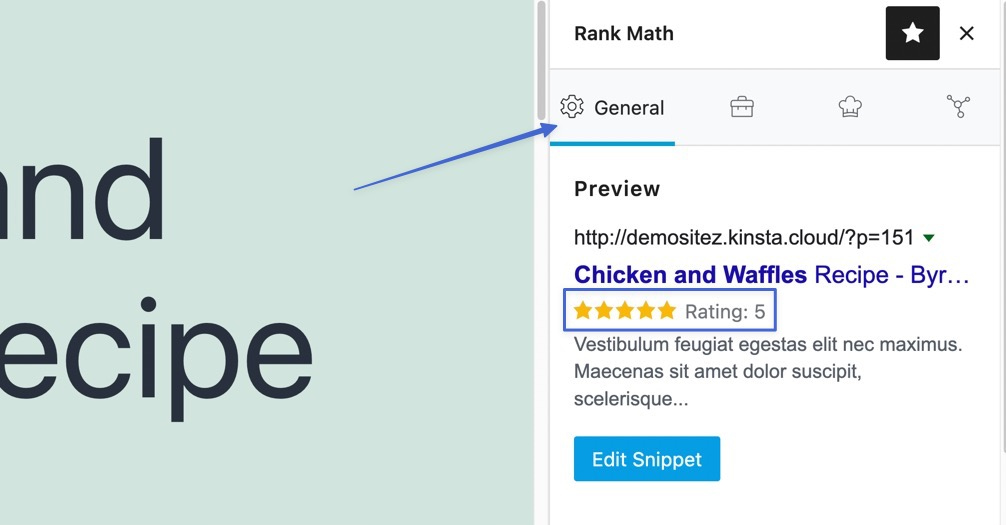
Another option is to paste the URL into Google'south Rich Results Test page. This provides previews of the rich results and explains any issues with your schema.
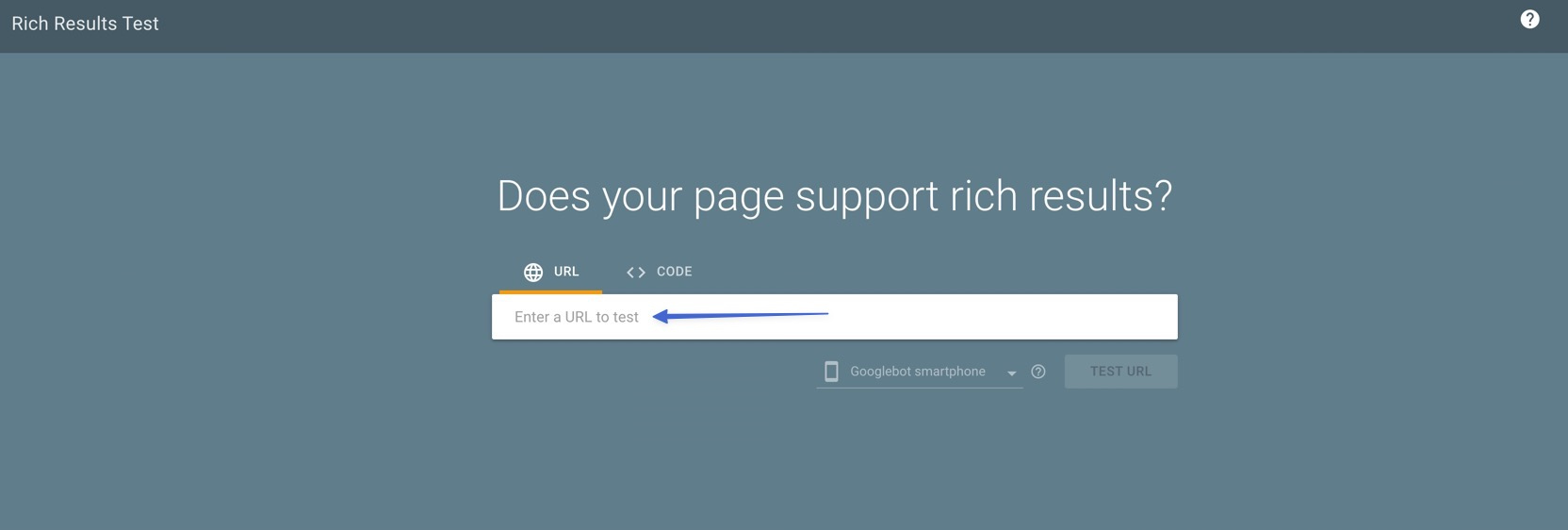
That's how to add schema to WordPress!
While schema markup might not accept a straight issue on your WordPress site'south SEO, it'southward all the same a dandy mode to make your content more visible in the organic search results, and then it's worth taking the fourth dimension to add it to your site.
Do you accept any other questions about how to add schema to WordPress? Leave a comment and we'll effort to help out!
Free guide
5 Essential Tips to Speed Up
Your WordPress Site
Reduce your loading time by even 50-80%
just past following simple tips.
Download free guide
How To Add Structured Data To Wordpress,
Source: https://themeisle.com/blog/how-to-add-schema-to-wordpress/
Posted by: rossoffied.blogspot.com


0 Response to "How To Add Structured Data To Wordpress"
Post a Comment